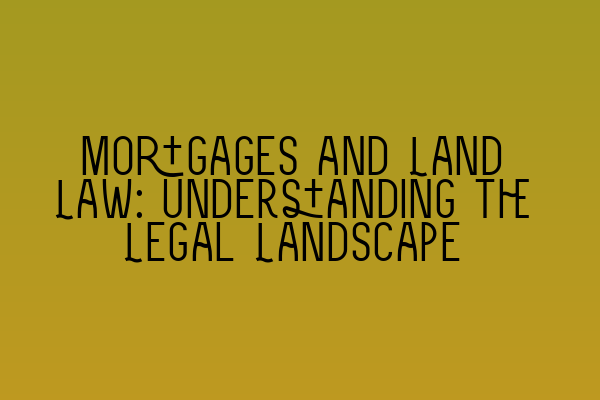Mortgages and Land Law: Understanding the Legal Landscape
Welcome to SQE Property Law & Land Law, your trusted solicitors in the field of property and land law. Our team of experts is here to guide you through the complex legal landscape surrounding mortgages and land ownership. In this blog post, we will delve into the intricacies of mortgages, examining how they work and exploring their relationship with land law. By the end of this article, you will have a comprehensive understanding of this crucial aspect of property law.
Before we dive in, let’s clarify what a mortgage is. Simply put, a mortgage is a legal agreement between a lender (usually a bank or a financial institution) and a borrower (the homeowner), whereby the borrower uses their property as collateral to secure a loan. This loan is typically used to purchase the property or to fund home improvements. It is important to note that a mortgage is a form of secured loan, meaning that if the borrower fails to make repayments, the lender has the right to repossess the property.
Now that we have a basic understanding of what a mortgage entails, let’s explore its relationship with land law. Land law governs the rights and obligations associated with land ownership, and it plays a pivotal role in the context of mortgages. In England and Wales, land ownership is primarily governed by the Land Registration Act 2002, which establishes a system of registered titles. This act dictates the requirements for registering a mortgage and ensures that the lender’s interest in the property is protected.
One of the key aspects of land law relevant to mortgages is the concept of legal and equitable interests. When a mortgage is taken out on a property, the lender obtains a legal interest in the property, which is registered with the Land Registry. This legal interest gives the lender the right to repossess the property if the borrower defaults on their mortgage repayments. On the other hand, the borrower retains an equitable interest in the property, which allows them to occupy and use the property as long as they comply with the terms of the mortgage agreement.
It is worth noting that obtaining a mortgage involves various legal processes, including the drafting and execution of legal documents such as the mortgage deed and the transfer of ownership. Additionally, the lender will typically conduct a valuation of the property to determine its market value and assess its suitability as collateral.
Understanding the legal landscape surrounding mortgages and land ownership is essential for anyone looking to buy or sell property. By working with experienced solicitors like ourselves, you can ensure that your rights and interests are protected throughout the process. Our team at SQE Property Law & Land Law has extensive knowledge and expertise in handling mortgage transactions, and we can guide you through every step of the process, from initial advice to drafting legal documents and registering your mortgage.
If you are preparing for the SQE 1 exam, it is crucial to have a solid understanding of property law, including mortgages and land law. We recommend checking out our preparation courses, which cover all the essential topics and provide practice exams to help you consolidate your knowledge. Additionally, our SQE 2 preparation courses can equip you with the necessary skills and knowledge to handle complex property transactions with confidence. Make sure to check our related articles for more information on SQE preparation and exam dates.
In conclusion, mortgages are a fundamental aspect of property law, and an understanding of this area is essential for both homeowners and legal professionals. By grasping the legal intricacies of mortgages and their relationship with land law, you can navigate the property market with confidence and ensure the protection of your rights. At SQE Property Law & Land Law, we are here to lend our expertise and guide you through every aspect of mortgage transactions. Contact us today to discuss your case or to find out more about our services.
